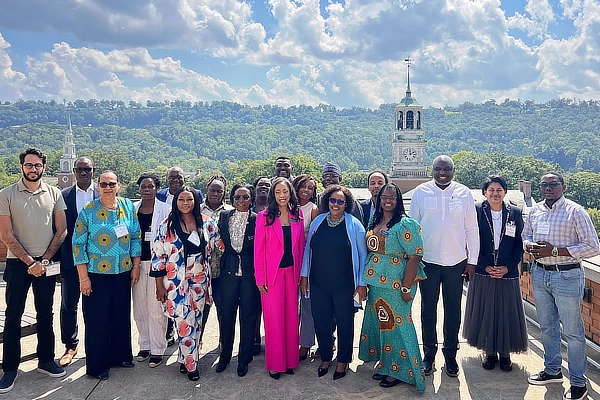
On Sept. 24, Samford University welcomed vice presidents and leaders from universities and colleges across the African continent. The consortium represented 11 countries and 16 higher education institutions.
In partnership with the U.S. Department of State and its International Visitor Leadership Program, Samford was one stop on a three-week tour of Alabama’s colleges, universities and civil rights history.
The consortium’s week in Birmingham included visits to Samford, Miles College, Lawson State Community College, Alabama State University, Alabama A&M University, the University of Alabama at Huntsville and the Birmingham Civil Rights Institute.
The Birmingham leg of the trip focused on building global educational partnerships, nonprofit initiatives, collaboration between universities and the private sector and promoting educational progress. Key themes included youth opportunities in community college education and employment, the legacy of HBCUs in the civil rights movement, and support for global research and entrepreneurship through university programs.
Monique Gardner Witherspoon, associate professor and associate dean of Orlean Beeson School of Education, provided the welcome and organized the event, working with U.S. Department of State and university liaisons to deliver professional development opportunities and hospitality for the guests.
“We were delighted to welcome our guests for a half-day workshop concentrating on establishing successful partnerships and nonprofit initiatives within the education sector,” said Witherspoon. “This opportunity not only gave us a chance to establish international relationships with other higher education institutions but also allowed us to showcase what we believe is the best in nonprofit education.”
Colin Coyne, vice president for finance, business affairs and strategy, provided opening remarks for the event, as did Peter J. Hughes, associate provost for faculty success, and De’Janae Tookes, assistant director of multicultural initiatives and events, who spoke on behalf of the Office of Student Success and Diversity.
Three faculty members from the College of Health Sciences served as presenters from the university to engage the group in professional development. All presenters are of African heritage and represent the best of Samford’s faculty in addressing issues of global influence and collaboration in their respective fields.
Ahinee Amamoo, chair, professor and director of graduate studies within the School of Public Health, led a roundtable discussion titled “The Nuts and Bolts of International Education and Exchange Programs.”
Christson Adedoyin, professor of social work in the School of Public Health, presented “Intercontinental Research Collaboration: Best Practices and Current Evidence.”
Prisca Collins, chair, program director and professor of physical therapy in the School of Health Professions, led a session titled “Intercontinental Collaborative Service-Learning and Professional Education Opportunities for Promoting Health Equity.”
Samford University is a nonprofit, private institution, dedicated to positively influencing the world through education, outreach, and service. As outlined in the university’s strategic plan, Fidelitas, the university regularly prepares students, faculty, and staff to engage others through athletic, cultural, economic, intellectual, language, political, religious and social exchanges.
